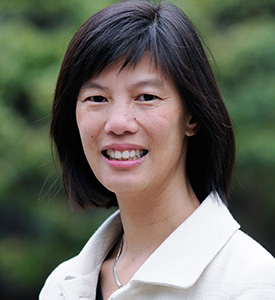Putting Stroke Recovery into Patients' Hands

Approximately 315,000 Canadians are living with the effects of stroke. (Source: Public Health Agency of Canada)
CIHR Foundation Grant Recipient
Dr. Janice Eng
Department of Physical Therapy
University of British Columbia, Vancouver
Dr. Eng's Research
Dr. Janice Eng's stroke research is already having an impact, both here in Canada and around the world. She has developed two major rehabilitation programs – the Fitness and Mobility Exercise (FAME) program and the Graded Repetitive Arm Supplementary Program (GRASP) – which are improving recovery for the 315,000 Canadians currently living with the effects of stroke.
The FAME program has been implemented at more than 200 sites in over 20 countries. It involves a series of tasks designed to improve balance, increase walking speed and strengthen muscles, and is helping the growing number of stroke survivors get the exercise they need. While most stroke rehab regimens involve one-on-one sessions in a hospital setting, FAME can be led by trained instructors working with small groups of stroke survivors in a community setting.
GRASP has been implemented in more than 1,300 sites in over 47 countries. It is a series of simple exercises that stroke survivors can do, in addition to their regular physical therapy, to improve their arm and hand function for day-to-day tasks, such as buttoning up a shirt or brushing their teeth.
Supporting Advances in Stroke Research
Stroke is an age-related condition, so the number of survivors needing care will climb as the Canadian population ages. People who have suffered a stroke often require extensive rehabilitation in order to regain their strength, balance and mobility. But not everyone has access to the standard, one-on-one forms of stroke rehab, and even if they do, they may not achieve long-lasting improvements. Also, stroke survivors sometimes experience additional health problems: 13% suffer a bone fracture as the result of a fall within three years of their stroke; 30% go on to have another stroke; and a stroke survivor's risk of cardiac-related death increases. To help patients regain their lives and improve their health, we need innovative approaches to delivering rehabilitative care for patients as they recover.
With her CIHR Foundation Grant, Dr. Eng will build on her earlier research to give stroke survivors additional tools to manage their own rehabilitation and help them create long-term lifestyle changes to improve their health and mobility. Specifically, she will explore whether a telehealth healthy lifestyle program, an internet-based arm exercise program, and self-monitoring wearable sensor technologies can help patients build stroke recovery exercises into their daily lives. By identifying technologies that will empower people take control of their recovery process, Dr. Eng's work will improve patients' quality of life and reduce their risk of secondary health complications.
"The flexibility of the Foundation grant will enable me to develop innovative treatments, evaluate them through rigorous multi-site clinical trials and move them quickly to the community to improve the recovery and health of Canadians who are living today with the effects of a stroke." – Dr. Janice Eng
About Dr. Eng
Dr. Eng completed her physical therapy and occupational therapy degree from the University of British Columbia, PhD at the University of Waterloo, and her post-doctoral work at Simon Fraser University. She received a Senior Scholar Award from the Michael Smith Foundation for Health Research in 2008, and has received multiple CIHR grants throughout her career. In addition, Dr. Eng has received numerous awards in recognition of her outstanding research efforts, including the Award for Excellence in Mentoring Early Career Faculty in 2010, the Jonas Salk Award for Lifetime Achievement in 2009 and the Killam Research Prize in 2006.
- Date modified: